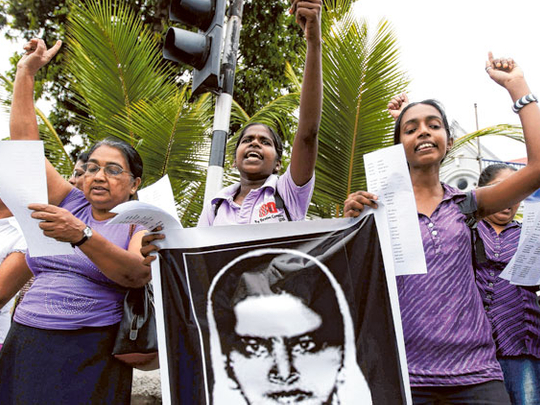
Riyadh: The beheading last week of a young Sri Lankan maid after she had spent six years in a Saudi prison following a death sentence passed in 2007 for killing her employer’s baby has turned the spotlight on the ills of the country’s antiquated legal system, according to Saudi legal experts.
Rizana Nafeek was 17 at the time the four-month-old baby under her care died. She had no access to a proper translator or to lawyers during the initial interrogation and the trial. Yet, all of that did nothing to sway the decision of the judges who enjoy wide discretion to interpret Islamic law, admit evidence and accept or dismiss lawyers from the courtroom at will.
Five years after King Abdullah Bin Abdul Aziz ordered a sweeping $2.2-billion (Dh8.07 billion) legal reform, aimed at training judges, codifying Sharia, introducing specialised commercial courts and speeding up the litigation procedures, lawyers and businessmen complain that the problems afflicting the Saudi legal system run very deep. They say that, in effect, little has been done to address the problems despite the hype that surrounded the reforms.
“The lack of real judicial reform has a catastrophic impact on both human rights and the business environment,” says Abdul Aziz Al Qasim, a lawyer. “Judges take up to seven or nine years to make a decision. Many companies and ordinary people can’t afford to wait for years to get their rights back, if they ever get it.”
Although the council of ministers last year approved a new arbitration law to curb court intervention in the arbitral process, lawyers complain that its application still depends on the interpretation and application of this law by the Saudi courts. Also the regulations have not been implemented yet.
In general, the outcome of trials and arbitration in Saudi Arabia have not been in favour of the non-Saudi side, businessmen and lawyers say. Yet, even for Saudis, clashing in court is hazardous. A judge is likely to side with those who look most pious or with the males against females.
“I have to keep lawyers with thick beards in the front line just to make sure I may get a fair verdict,” says a Saudi businessman. “Many people manipulate the system. If someone owes me a million riyal for buying goods, he knows if I go to court it will take years to get my money back, so he offers to pay only 400,000 riyals for example. It is disastrous for business.’’
Some cheque fraud cases could take up to 20 years or even more, during which lawyers die and judges change, so the cases have to be restarted all over again.
Although erroneous court rulings are not unique to Saudi Arabia, in other countries lawyers can, at least, study reasoning or facts used in a given verdict and can usually predict the outcome. But Saudi Arabia follows a strict interpretation of Sharia and judges insist that they should use their own interpretation based on old religious sources rather than previous court verdicts based on other ‘human’ judgement. The legal system rejects both the system of precedent used in common law countries and the civil codes used in civil law systems.
The principles of Sharia are the bases for civil codes in other Arab and Islamic countries. But in Saudi Arabia literal interpretations leave little room for creativity, especially in the more complex commercial disputes that have no precedent in ancient Islamic history.
The Islamic ban on usury, for instance, means that if a businessman or a company owes money, the judge may decide to ignore any clause in the contract that imposes late fees or fines, because it will be considered interest. Moreover, if someone sold a faulty machine that caused death, injury or just broke down, the suppliers might argue that it was God’s will, businessmen complain.
Similar cases often yield different verdicts and sentences.
“I have not seen any progress made, I have been hearing that there will be reforms ‘soon’,’’ says Bandar Al Nogaithan, owner of Al Nogaithan, a law firm. “The same judge presides over a murder trial one day, also deals with contract disputes, and cheque fraud. They simply do not have the training or the capacity to deal with such complex issues. It is not their fault, they are not trained.’’
Despite criticism, lawyers note that the Court of Grievances, which handles commercial disputes relating to foreigners and their investments, has improved tremendously in recent years and issued remarkable verdicts.
In 2009, King Abdullah dismissed the ultra-conservative judge Saleh Al Lohaidan, head of the Supreme Judicial Council, who was known for resisting modernising the system and codifying Islamic laws. Since then, younger judges from various backgrounds have been brought in and sent on visits to Western countries. Despite the progress, legal experts complain of the slow pace of reform.
“We always hear about conservative people ‘resisting’ reforms,’’ Al Nogaithan says. “The fact is no one is resisting because there is no real reform vision or plan. Those who are undertaking the reforms do not have any international exposure or experience.”
Foreign companies in Saudi Arabia stipulate in contracts that dispute resolution should take place in foreign jurisdictions. However, enforcing foreign rulings in Saudi Arabia is also usually a challenge.
— Financial Times












